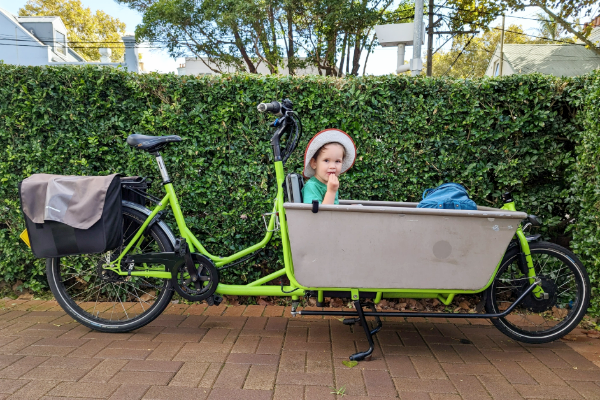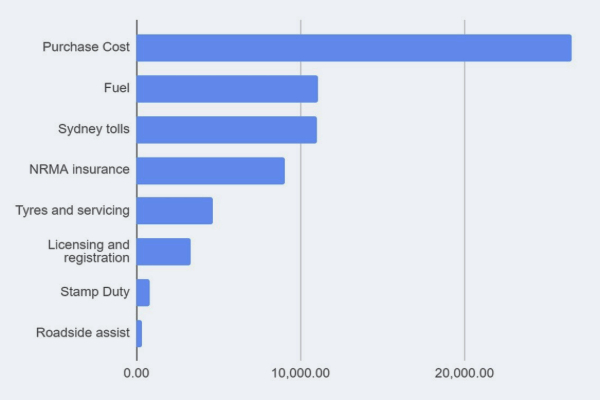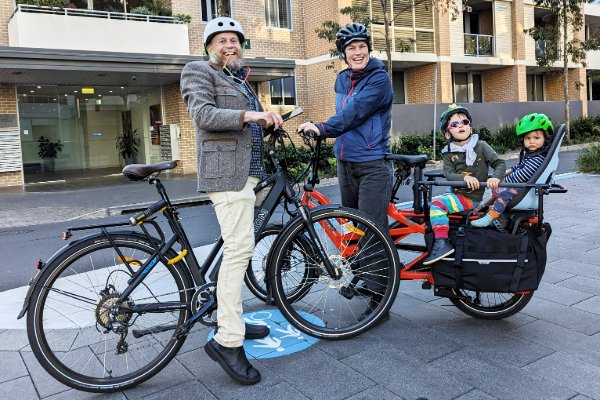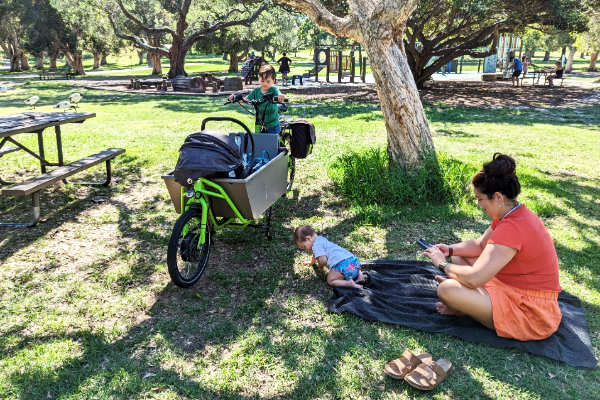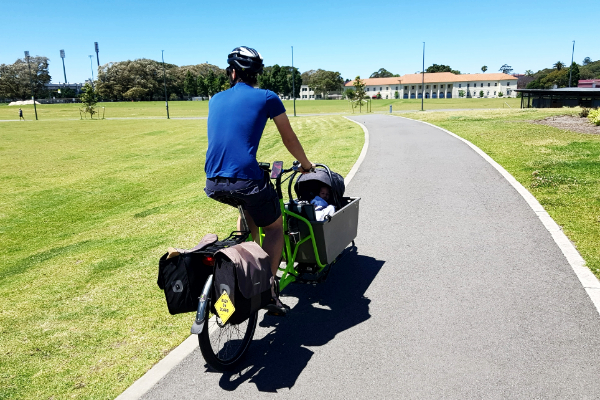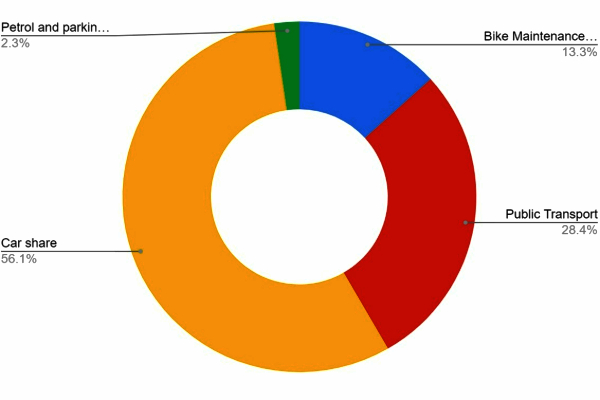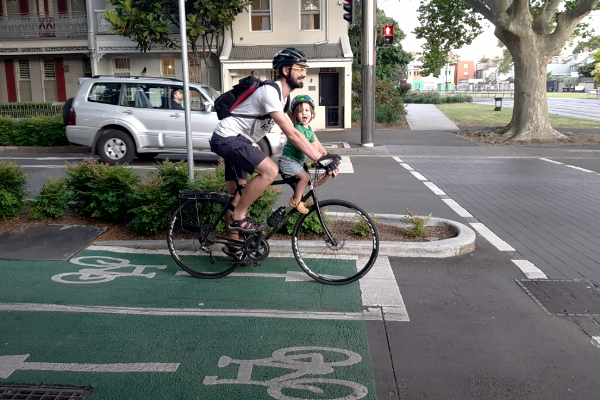Not compared to car ownership!
At Bicycle NSW, we regularly hear that people are put off buying an e-bike by the high purchase cost. Our content writer, Monique Ewen, set out to understand whether e-bikes really are too expensive. She did this by comparing the cost of ownership for e-bikes and cars.
Given the current cost of living crisis, these numbers are critical to helping people choose the best way to get around.
Monique has used e-cargo bikes as her main mode of transport since her first child was born in 2020. Inspired by the benefits of bike , she founded the Sydney Cargo Bikes Facebook group to connect with other young families who prefer life on two wheels.
“You could buy a car for that!”
Our first cargo bike was great for carrying babies and all their paraphernalia (Image: Monique Ewen)
People often tell me that e-bikes are prohibitively expensive. When I say that we spent $9,500 on our cargo bike, the response is often raised eyebrows and shock. People say, “But you could buy a car for that!”
This is true. But the purchase cost does not reflect the full cost of car ownership.
Crunching the numbers
Our family could buy an eight-year-old Subaru Forester for $26,500 (CarSales). It would cost $7,863 a year to maintain, totalling $66,611 over five years. That is, assuming the car doesn’t need any additional or unexpected work.
A chart showing the average cost of car ownership for a single-car household over five years (Compiled by Monique Ewen)
These figures are based on the Australian Automobile Association Transport Affordability Dashboard, a quote from the NRMA online calculator ($1804.75), and Revenue NSW’s stamp duty quote ($795). The annual fuel cost ($2,206.80) was calculated based on the average vehicle in NSW driving 12,000km a year (ABS), using about 10L every 100km (Drive) and the fuel in our suburb being $1.839/L(Fuel Check).
Because the cost of maintaining a car is so high, car ownership is expensive even when the car itself is free. At one point, my aunt and uncle offered us an old Citroen C4 as a gift. My uncle only wanted $2000 to cover the registration and servicing costs that he had just paid.
We said no thanks!
According to the Australian Automobile Association, the average household in Sydney has two cars and pays $15,408.12 a year to maintain them. That includes petrol, tolls, insurance, servicing, registration, licensing and roadside assist. So, as a one car household with a “free” Citroen, we would pay $7,704.06 per year, or $38,520.30 over five years. Likely more, given the car was old and Citroen parts tend to be expensive.
Out with my kids and my dad on our e-bikes (Image: Monique Ewen)
Being a two-bike household costs 1.7% of the annual cost of being a two-car household
Instead of two cars, we have two electric cargo bikes that can each carry our two children, now aged 2 and 4. The first bike cost $8500, has a big box on the front that can fit multiple children and/or a baby capsule. It lives in our unit block’s basement garage. The second cost $9500, has a long rack on the back and lives in our shower.
In 2023, we spent $262 on bike maintenance and parts for both our e-bikes and our three regular bikes. That’s just 3.4% of the average annual cost of maintaining one car, or 1.7% of the annual cost for two car households.
In fact, discounting purchasing costs, we are spending about the same amount each year on our bikes ($262) as two car households spend each week on their cars ($15,408.12 / 52 = $296).
Between 2020 and 2025, we will have spent around $19,500 on our bikes in total. This is 29% of the equivalent we would spend on the Subaru and 51% of the cost of the Citroen in the same time period.
Family day out at Centennial Park learners’ cycleway. Credit: Monique Ewen.
We make a conscious choice not to own a car
Despite the financial benefits, we are not a bike family only for financial reasons. Our family chooses not to own a car because we love riding our bikes and we are committed to doing what we can to reduce emissions. We make deliberate choices to go to more local places and take public transport for longer journeys.
Cycling through Moore Park with our baby in the box bike.(Image: Monique Ewen)
We choose to live in the city so that we can walk and cycle wherever we need to go. This means we sacrifice some things. We can’t afford a house. Our flat is small. We don’t have a garden. Sometimes we avoid going places if we need a car. Like, seeing my aunt and uncle on Sydney’s Northern Beaches.
Cars are very expensive – even when you don’t own one!
Despite not owning a car, car use still makes up the majority (58%) of our annual transport spending ($1151 out of $1973). This goes to the occasional car share and buying petrol when we borrowed my parents’ cars.
Pie chart showing Monique’s household spending on transport in 2023 (Image: Monique Ewen)
This year, we are signing up for a Household Membership from Bicycle NSW. At $180 per year, that will take us to around $500 a year for maintaining our bikes - just 3% of the average household’s annual cost of car ownership.
If the upfront cost of an e-bike is still prohibitive, Bicycle NSW partners Lug+Carrie provides an awesome subscription service from $48/week. This is a particularly good option for people who aren’t sure how much they will use an e-bike.
Cars are bad for kids
It sometimes feels strange to go against the norm of raising kids in the suburbs. But we aren’t alone in making this choice. Jason Slaughter from Not Just Bikes made a great video about Why We Won’t Raise Our Kids in Suburbia.
Cars are noisy, polluting, and take up a lot of space. They’re bad for town centres. They cause huge numbers of deaths and injuries. They are the leading cause of death for kids aged 1 to 14. And they contribute to rising health costs by making us all less physically active. When you look at the down sides, it is hard to understand how we can continue to be so committed to cars.
My partner and our littlest enjoying the fantastic Bourke Street cycleway in Surry Hills (Image: Monique Ewen)
It is easy to be blind to the many costs of cars
Dr Ian Walker, a professor of environmental psychology at Swansea University in Wales, has described this as ‘motonormativity’. That is, a cultural inability to think objectively about how we use cars. There’s a great interview with Ian Walker about ‘car brain’ on The War on Cars.
Just one more thing
Not only do we have the best bicycle insurance, but Bicycle NSW has been actively campaigning for 48 years for better infrastructure for bike riders of all ages and abilities. Join us now and support our campaign for Better Streets so more families can benefit from a car-lite lifestyle.

